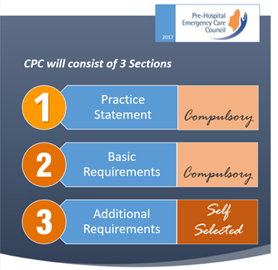Continuous Professional Competency (CPC) for Paramedics and Advanced Paramedics
Clinical leadership is key to both promoting high-quality clinical care and transforming services to achieve higher levels of excellence. (Stanwick and McKimm, 2011)
PHECC aim to support the principle of continuous growth and development of Irish pre-hospital emergency care practitioners through its Continuous Professional Competency initiative.
PHECC Model of CPC

In 2013 PHECC Council approved a mixed model of CPC as a standard. The CPC model contains three sections and requires pre-hospital practitioners to:
-
Provide a practice statement
- Practitioners clarify where and with whom they practice
-
Provide evidence of the basic requirements
- Patient contacts
- Evidence of current CPG status
- CFR status
-
Provide evidence of their additional requirements
(Nominated amount of points per year)
- Self-selected options
- Mentor/Mentee activities
- Reflective practice/case studies
CPC research
A
research survey on CPC (Knox et al, 2014) that was intended to guide and inform CPC implementation in Ireland recorded the opinions of PHECC registered practitioners with 598 paramedics and 191 advanced paramedics (AP) participating. This survey results reveal that:
- evidence of CPC should be maintained (74%), and
- a small majority of paramedics/APs surveyed (53%), although not obligated, maintained a professional portfolio at the time of the survey.
The survey also reported that:
“77% of the survey respondents (474) favoured a ‘mixed’ model approach for CPC with a similar amount supporting the idea of minimum standard requirements which involved evidence of patient care. This ‘mixed’ model approach would allow for a ‘compulsory’ element to the CPC requirements and an additional ‘voluntary’ allowance that is still required but would allow the registrant some flexibility in deciding which activities to choose”.
CPC Subcommittee
PHECCs Education and Standards Committee have recently nominated a CPC subcommittee to establish the CPC standard for the paramedic and AP divisions of the register. This subcommittee will report back through the committee process and make recommendations to Council on an appropriate standard for paramedic and AP CPC. Councils recommendations will form the basis of an implementation strategy and PHECC will continue to notify practitioners about any upcoming initiatives related to CPC.
CPC for EMTs
In 2017, following operational implementation of the EMT CPC standard, the first round of annual CPC portfolio assessments have been ongoing. If you’re interested in reading an update on the EMT CPC assessment process,
click here.
References
Swanwick T, McKimm J. ABC of Clinical Leadership. Hoboken, NJ: John Wiley & Sons; 2011.
Knox et al. Continuous Professional Competence (CPC) for Irish paramedics and advanced paramedics: a national study. BMC Medical Education 2014 14:41.